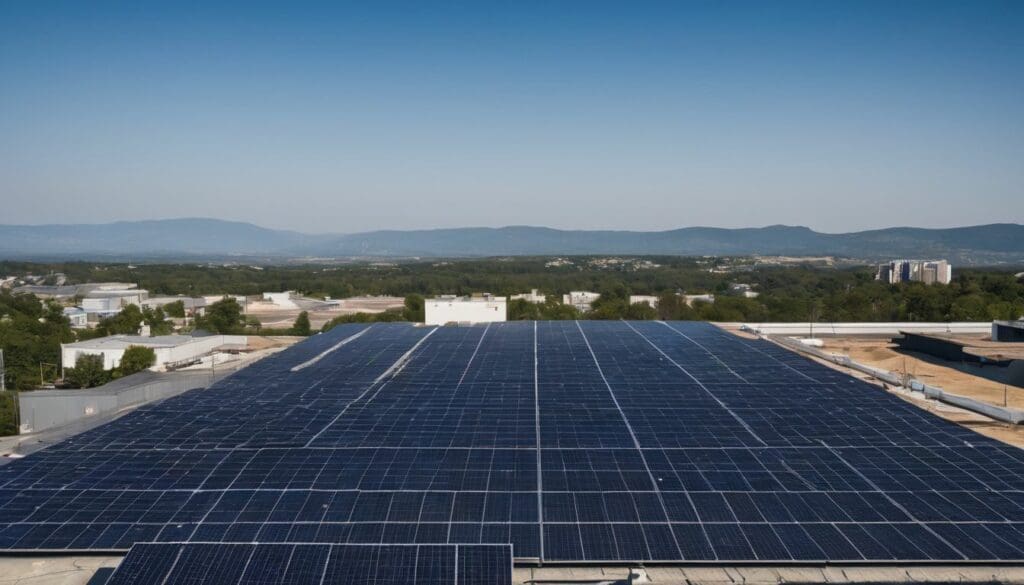As energy costs soar, businesses everywhere are feeling the pinch. In fact, renewable energy is now cheaper than traditional fossil fuels in many parts of the world. This article will guide you through various sustainable energy options that can cut costs and benefit the planet.
Dive into a greener future!
Key Takeaways
- Businesses can significantly cut operational costs by adopting renewable energy sources such as solar panels, wind turbines, geothermal systems, and biomass solutions.
- Choosing sustainable power options like solar or wind energy not only helps reduce carbon emissions but also positions a business as an eco-friendly leader, boosting its reputation among consumers and attracting employees who value environmental stewardship.
- Renewable energy provides businesses with stable and predictable costs for their energy needs, shielding them from the volatility of fossil fuel prices.
- Implementation of renewable energies leads to increased corporate sustainability by meeting regulatory requirements on greenhouse gas emissions and potentially avoiding fines related to carbon outputs.
- Incorporating renewable energy into business operations requires initial steps of conducting an energy efficiency audit, seeking expert advice for cost-effective solutions, evaluating different options including associated financial incentives, followed by strategic planning for implementation and ongoing maintenance.
Why Renewable Energy for Businesses?
Moving on from an overview of the renewable energy landscape, let’s delve into why businesses are increasingly harnessing these ecofriendly power options. Companies across the globe are recognising that sustainable energy solutions are more than just environmental gestures; they’re sound strategic decisions.
Renewable electricity alternatives like solar panels and wind farms offer a stable, predictable cost for energy over time, unlike fluctuating fossil fuel prices. This can lead to significant savings and budget certainty.
Moreover, adopting green energy alternatives positions a business as a responsible leader in conservation and environmental stewardship. Not only does this enhance brand image with environmentally conscious consumers, but it also attracts like-minded employees who value working for companies with sustainability at their core.
Clean energy resources contribute to reduced greenhouse gas emissions, helping firms meet regulatory requirements and avoid potential fines related to carbon outputs. With every installation of geothermal sources or biomass systems, businesses take crucial steps towards reducing their carbon footprint while setting themselves up as forward-thinking players in the renewable energy marketplace.
Types of Renewable Energy Options
Solar power, wind energy, geothermal energy, and biomass energy are just a few examples of renewable energy options that businesses can explore to reduce their reliance on traditional fossil fuels.
Each option comes with its own set of benefits and considerations for implementation.
Solar Power
Solar power offers a sustainable and renewable energy solution for businesses, effectively harnessing the sun’s energy to generate electricity. By installing solar panels, companies can significantly reduce their reliance on traditional grid power and decrease their carbon footprint.
This eco-friendly alternative also presents long-term cost savings by mitigating the impact of fluctuating energy prices and reducing overall electricity expenses. Furthermore, embracing solar power enhances a business’s environmental commitment, bolstering its brand image and appeal to environmentally conscious consumers.
Incorporating solar power into business operations aligns with sustainability goals while promoting energy independence and reliability. Additionally, it serves as a forward-thinking investment in future-proofing against rising energy costs.
Wind Energy
Transitioning from solar power to wind energy, businesses can also harness the power of the wind to generate renewable electricity. Wind energy involves using turbines to capture the kinetic energy of the wind and convert it into electrical power.
By integrating wind energy solutions into their operations, businesses can reduce their reliance on traditional fossil fuels and contribute to a greener, more sustainable future. Incorporating wind energy aligns with eco-friendly initiatives, making it an attractive option for environmentally conscious individuals seeking alternative energy sources for business purposes.
Businesses that embrace wind energy take significant steps towards reducing their carbon footprint and promoting environmental conservation within their communities.
Geothermal Energy
Geothermal energy harnesses heat from the earth to produce power, making it a reliable and renewable energy source for businesses. By utilising naturally occurring heat, companies can benefit from consistent energy production without relying on external factors like weather conditions.
Geothermal energy is a sustainable and eco-friendly option that aligns with conservation efforts while offering long-term cost savings and reduced carbon footprint.
Businesses can explore geothermal energy as a clean and efficient alternative, contributing to environmental sustainability while ensuring reliable power sources for operations. Transitioning to geothermal energy presents an opportunity for companies to establish themselves as leaders in eco-friendly practices and further support conservation efforts within their industries.
Biomass Energy
Transitioning from geothermal energy, let’s delve into the realm of biomass energy. Biomass energy is derived from organic materials such as wood, agricultural residues, and waste.
These resources can be converted into biofuels, biopower, or bioproducts through processes like combustion, gasification, and anaerobic digestion. This renewable energy source offers a sustainable alternative to fossil fuels while also contributing to waste management and reducing greenhouse gas emissions.
Businesses can harness the potential of biomass energy to lower their carbon footprint and promote eco-friendly practices in line with environmental conservation efforts.
Benefits of Implementing Renewable Energy Solutions
Implementing renewable energy solutions can result in cost savings, positive environmental impact, enhanced brand image and customer appeal, energy independence and reliability, as well as long-term investment and future-proofing.
Cost savings
Businesses can significantly reduce their operational costs by transitioning to renewable energy sources. This switch can lead to substantial savings on electricity bills, reducing the financial burden and increasing overall profitability.
Renewable energy options such as solar power and wind energy offer long-term cost benefits due to minimal maintenance requirements and the ability to generate power independently.
Implementing renewable energy solutions allows businesses to take control of their energy expenses, providing a competitive edge in the marketplace. By investing in sustainable power alternatives like geothermal or biomass energy, businesses can secure stable and predictable energy costs over time, shielding themselves from fluctuating fossil fuel prices while positively impacting the environment.
Positive environmental impact
Implementing renewable energy solutions can have a positive environmental impact. Transitioning to eco-friendly energy sources like solar power and wind energy significantly reduces carbon emissions, contributing to cleaner air and a healthier environment.
Choosing sustainable power options for businesses supports conservation efforts and helps in building a more environmentally friendly marketplace. Businesses can play a crucial role in promoting clean energy choices and reducing their overall ecological footprint.
Switching to renewable electricity alternatives is essential for corporations, ensuring reduced reliance on non-renewable fossil fuels while creating a more sustainable future. Geothermal, biomass, and other alternative energy sources also offer significant environmental benefits for companies looking to adopt green energy opportunities for their operations.
Enhanced brand image and customer appeal
Implementing renewable energy solutions can enhance a business’s brand image, demonstrating a commitment to sustainability and environmental responsibility. This can appeal to environmentally conscious consumers who prioritise supporting eco-friendly companies.
Utilising clean energy sources like solar power or wind energy sends a clear message that the company is dedicated to reducing its carbon footprint, attracting customers who value conservation efforts and sustainable practices in the marketplace.
By embracing renewable energy options for businesses, companies gain an opportunity to differentiate themselves from competitors and tap into a growing market of environmentally aware consumers looking for eco-friendly products and services.
Energy independence and reliability
Businesses can achieve energy independence and reliability by transitioning to renewable energy sources. This shift reduces reliance on external power providers, ensuring a consistent and stable energy supply for operations.
Implementing sustainable energy options also shields businesses from fluctuations in traditional energy prices, offering long-term cost stability and predictability. By integrating geothermal, solar, or wind energy solutions, companies not only enhance their environmental sustainability but also establish a reliable power infrastructure for continued productivity.
Embracing renewable power solutions is essential for companies seeking to reduce their carbon footprint while securing uninterrupted access to clean and sustainable electricity. Alternative energy sources offer businesses the opportunity to take control of their power supply while contributing positively to environmental conservation efforts.
Long-term investment and future-proofing
After establishing energy independence and reliability, considering renewable energy solutions becomes a long-term investment for businesses. These sustainable options future-proof operations against unpredictable energy costs and supply disruptions while supporting environmental stewardship.
Embracing renewable energy demonstrates commitment to green initiatives, enhancing brand image and customer appeal.
Switching to eco-friendly power sources such as solar, wind, geothermal or biomass offers businesses an opportunity to build a sustainable legacy by reducing reliance on traditional energy sources.
Steps to Implement Renewable Energy Practices
Identify areas for energy efficiency within the business, consult with experts to evaluate options and costs, and then proceed with implementation and maintenance of renewable energy solutions.
Identify areas for energy efficiency
Evaluate your business operations to identify areas for energy efficiency. Start by conducting an energy audit to pinpoint where energy is being used inefficiently. Consider upgrading to energy-efficient appliances, optimising lighting systems, and improving insulation to reduce energy wastage.
Implementing these changes can lead to significant cost savings while reducing your carbon footprint.
Assess the heating, cooling, and ventilation systems in your workplace for opportunities to improve their efficiency. Proper maintenance of HVAC systems and adjusting temperature settings can contribute to substantial energy savings over time.
Consultation with experts
After identifying areas for energy efficiency, it’s crucial to seek consultation with experts in the field of renewable energy solutions. Engaging with knowledgeable professionals can provide valuable insights into the suitability and practicality of different eco-friendly energy sources for businesses.
Experts can assess the specific requirements and constraints of your business, offering tailored advice on the most viable renewable energy options available in today’s marketplace.
Their expertise can guide you through evaluating the costs, benefits, and potential implementation challenges associated with sustainable power solutions for corporations.
Once you have identified areas for energy efficiency within your business operations, seeking consultation from experts allows you to explore the most suitable renewable energy options available in today’s marketplace.
Evaluation of options and costs
When considering renewable energy options, it’s essential to evaluate the various choices and associated costs. Here are steps to ensure a comprehensive evaluation:
- Research and compare different types of renewable energy sources such as solar power, wind energy, geothermal energy, and biomass energy.
- Assess the initial investment required for each option, including installation costs and equipment.
- Consider the long – term savings potential by analysing the operational and maintenance costs over the lifespan of each renewable energy solution.
- Evaluate the potential financial incentives, grants, or tax credits available for implementing renewable energy solutions in your business.
- Examine the environmental benefits of each option, including its impact on reducing carbon emissions and overall sustainability.
- Seek expert advice from professionals who specialise in renewable energy to gain insights into the most suitable options for your business operations.
- Determine the feasibility of integrating renewable energy solutions within your existing infrastructure without compromising operational efficiency.
Implementation and maintenance
- Regular monitoring of energy production and consumption to identify any fluctuations or issues.
- Conduct routine maintenance checks on renewable energy equipment such as solar panels, wind turbines, or geothermal systems to maximise efficiency.
- Train personnel on proper operation and maintenance procedures to ensure safe and effective use of renewable energy technologies within the business environment.
- Collaborate with reliable service providers for periodic servicing and repairs to address any technical concerns promptly.
- Implement proactive measures to mitigate potential risks or disruptions in renewable energy supply, safeguarding uninterrupted operations.
Conclusion
In conclusion, businesses can benefit from renewable energy solutions. Implementing these alternatives can lead to cost savings and a positive environmental impact. Transitioning to eco-friendly energy sources also enhances brand image and customer appeal.
By exploring sustainable energy options, businesses can contribute to a greener future while ensuring long-term reliability and independence in their energy supply.
FAQs
1. What renewable energy options are available for businesses?
Businesses can explore a variety of renewable energy options including solar and wind energy, geothermal sources, and other eco-friendly power alternatives to suit their commercial needs.
2. Why should companies consider switching to green energy?
Switching to green energy choices not only helps the environment but also introduces potential savings in operations due to improved energy efficiency practices.
3. Can all types of businesses use renewable electricity alternatives?
Yes, there are sustainable and clean energy choices available for enterprises of every size, from small start-ups to large industries seeking environmentally friendly power solutions.
4. How do businesses find the right alternative energy solutions?
Companies can delve into the renewable energy marketplace or seek expert advice on tailor-made eco-friendly energy sources that fit their specific industry requirements.
5. Are there benefits to implementing renewable power solutions besides being eco-friendly?
By transitioning to renewable sources of power like solar or wind, companies not only contribute positively towards reducing carbon footprints but may also benefit from lower long-term costs associated with these sustainable energy options for business operations.





